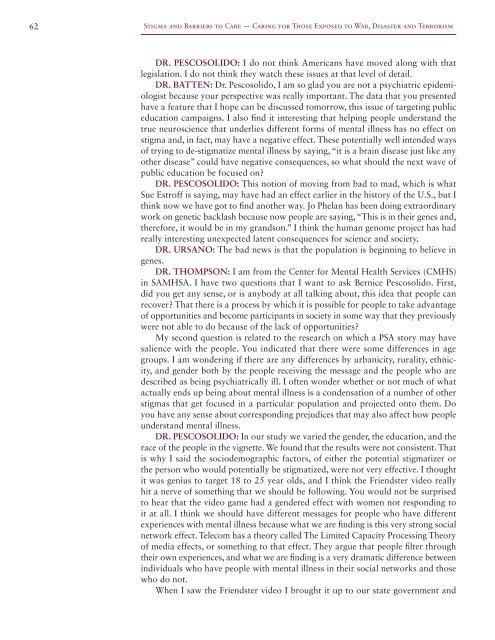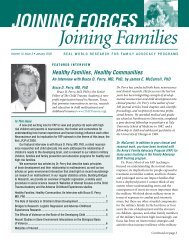stigma and barriers to care - Uniformed Services University of the ...
stigma and barriers to care - Uniformed Services University of the ...
stigma and barriers to care - Uniformed Services University of the ...
Create successful ePaper yourself
Turn your PDF publications into a flip-book with our unique Google optimized e-Paper software.
62<br />
Stigma <strong>and</strong> Barriers <strong>to</strong> Care — Caring for Those Exposed <strong>to</strong> War, Disaster <strong>and</strong> Terrorism<br />
DR. PESCOSOLIDO: I do not think Americans have moved along with that<br />
legislation. I do not think <strong>the</strong>y watch <strong>the</strong>se issues at that level <strong>of</strong> detail.<br />
DR. BATTEN: Dr. Pescosolido, I am so glad you are not a psychiatric epidemiologist<br />
because your perspective was really important. The data that you presented<br />
have a feature that I hope can be discussed <strong>to</strong>morrow, this issue <strong>of</strong> targeting public<br />
education campaigns. I also find it interesting that helping people underst<strong>and</strong> <strong>the</strong><br />
true neuroscience that underlies different forms <strong>of</strong> mental illness has no effect on<br />
<strong>stigma</strong> <strong>and</strong>, in fact, may have a negative effect. These potentially well intended ways<br />
<strong>of</strong> trying <strong>to</strong> de‐<strong>stigma</strong>tize mental illness by saying, “it is a brain disease just like any<br />
o<strong>the</strong>r disease” could have negative consequences, so what should <strong>the</strong> next wave <strong>of</strong><br />
public education be focused on<br />
DR. PESCOSOLIDO: This notion <strong>of</strong> moving from bad <strong>to</strong> mad, which is what<br />
Sue Estr<strong>of</strong>f is saying, may have had an effect earlier in <strong>the</strong> his<strong>to</strong>ry <strong>of</strong> <strong>the</strong> U.S., but I<br />
think now we have got <strong>to</strong> find ano<strong>the</strong>r way. Jo Phelan has been doing extraordinary<br />
work on genetic backlash because now people are saying, “This is in <strong>the</strong>ir genes <strong>and</strong>,<br />
<strong>the</strong>refore, it would be in my gr<strong>and</strong>son.” I think <strong>the</strong> human genome project has had<br />
really interesting unexpected latent consequences for science <strong>and</strong> society.<br />
DR. URSANO: The bad news is that <strong>the</strong> population is beginning <strong>to</strong> believe in<br />
genes.<br />
DR. THOMPSON: I am from <strong>the</strong> Center for Mental Health <strong>Services</strong> (CMHS)<br />
in SAMHSA. I have two questions that I want <strong>to</strong> ask Bernice Pescosolido. First,<br />
did you get any sense, or is anybody at all talking about, this idea that people can<br />
recover That <strong>the</strong>re is a process by which it is possible for people <strong>to</strong> take advantage<br />
<strong>of</strong> opportunities <strong>and</strong> become participants in society in some way that <strong>the</strong>y previously<br />
were not able <strong>to</strong> do because <strong>of</strong> <strong>the</strong> lack <strong>of</strong> opportunities<br />
My second question is related <strong>to</strong> <strong>the</strong> research on which a PSA s<strong>to</strong>ry may have<br />
salience with <strong>the</strong> people. You indicated that <strong>the</strong>re were some differences in age<br />
groups. I am wondering if <strong>the</strong>re are any differences by urbanicity, rurality, ethnicity,<br />
<strong>and</strong> gender both by <strong>the</strong> people receiving <strong>the</strong> message <strong>and</strong> <strong>the</strong> people who are<br />
described as being psychiatrically ill. I <strong>of</strong>ten wonder whe<strong>the</strong>r or not much <strong>of</strong> what<br />
actually ends up being about mental illness is a condensation <strong>of</strong> a number <strong>of</strong> o<strong>the</strong>r<br />
<strong>stigma</strong>s that get focused in a particular population <strong>and</strong> projected on<strong>to</strong> <strong>the</strong>m. Do<br />
you have any sense about corresponding prejudices that may also affect how people<br />
underst<strong>and</strong> mental illness.<br />
DR. PESCOSOLIDO: In our study we varied <strong>the</strong> gender, <strong>the</strong> education, <strong>and</strong> <strong>the</strong><br />
race <strong>of</strong> <strong>the</strong> people in <strong>the</strong> vignette. We found that <strong>the</strong> results were not consistent. That<br />
is why I said <strong>the</strong> sociodemographic fac<strong>to</strong>rs, <strong>of</strong> ei<strong>the</strong>r <strong>the</strong> potential <strong>stigma</strong>tizer or<br />
<strong>the</strong> person who would potentially be <strong>stigma</strong>tized, were not very effective. I thought<br />
it was genius <strong>to</strong> target 18 <strong>to</strong> 25 year olds, <strong>and</strong> I think <strong>the</strong> Friendster video really<br />
hit a nerve <strong>of</strong> something that we should be following. You would not be surprised<br />
<strong>to</strong> hear that <strong>the</strong> video game had a gendered effect with women not responding <strong>to</strong><br />
it at all. I think we should have different messages for people who have different<br />
experiences with mental illness because what we are finding is this very strong social<br />
network effect. Telecom has a <strong>the</strong>ory called The Limited Capacity Processing Theory<br />
<strong>of</strong> media effects, or something <strong>to</strong> that effect. They argue that people filter through<br />
<strong>the</strong>ir own experiences, <strong>and</strong> what we are finding is a very dramatic difference between<br />
individuals who have people with mental illness in <strong>the</strong>ir social networks <strong>and</strong> those<br />
who do not.<br />
When I saw <strong>the</strong> Friendster video I brought it up <strong>to</strong> our state government <strong>and</strong>




